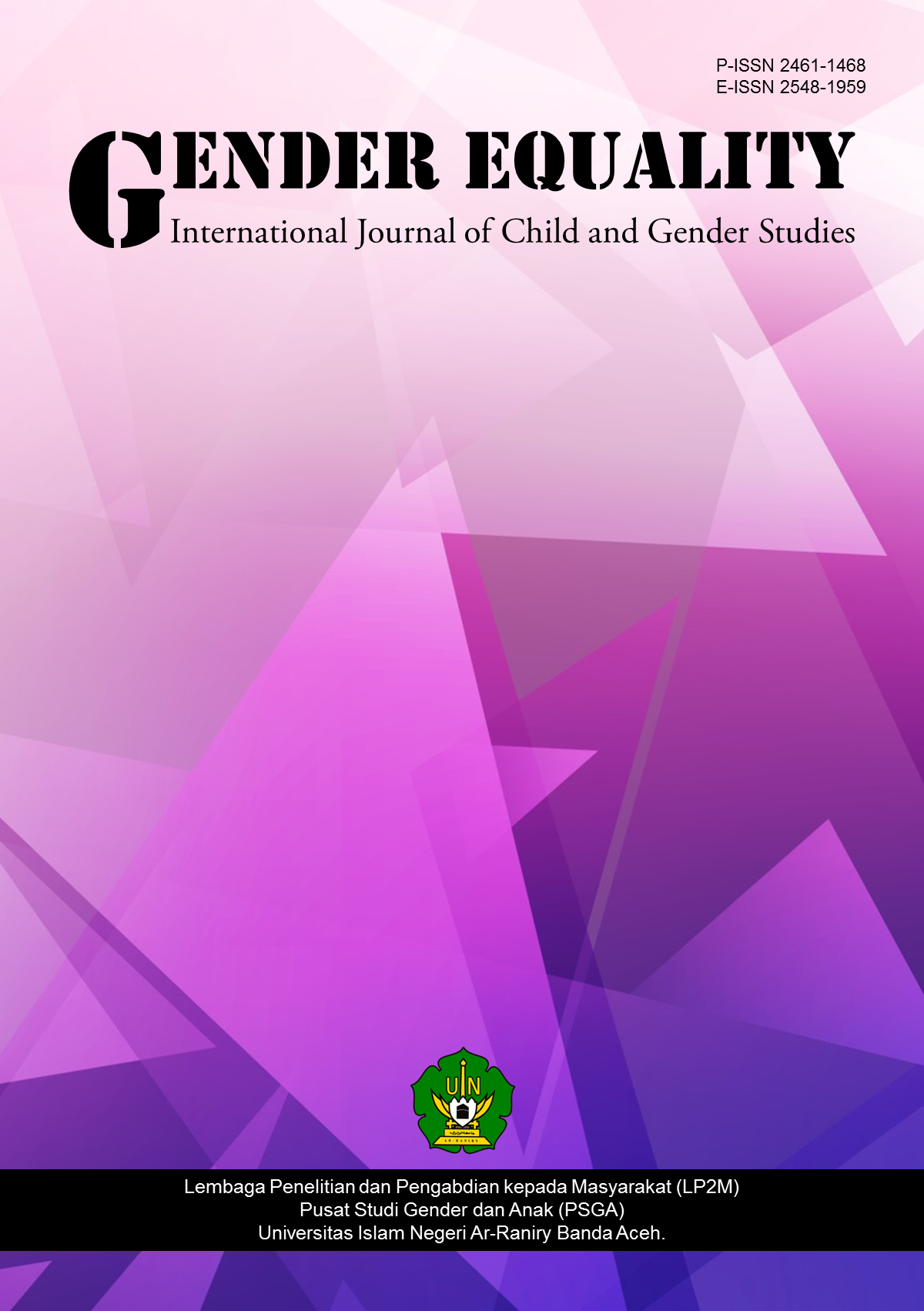IS OUR CHILD TOO YOUNG TO LEARN ABOUT GENDER EQUALITY? AN INTERPRETATION OF GENDER EDUCATION IN ACEH FAMILIES
DOI:
https://doi.org/10.22373/equality.v6i2.7719Keywords:
Gender Education, Gender Equality, Children, Family, AcehAbstract
This study aims to reveal gender-based discrimination, forms of gender education, and the importance of gender education in Acehnese families. This study was conducted by using the method of descriptive qualitative with data collection techniques through observation and interview. The result showed that in Acehnese families, the forms of gender-based discrimination that often faced by women are inequality in housework distribution and childcare. In Aceh, most men still play fewer roles in taking care of children because domestic jobs are seen to be women’s’ responsibilities. Another form of gender-based discrimination in Aceh is domestic violence against women. The result also demonstrated that in Acehnese families there is no gender education because many people do not understand the term of gender equality and gender issues are considered as western culture and still taboo to discuss. Gender education in the family is important because children acquire gender stereotypes at an early age, and they learn about gender equality from their family for the first time. Teaching gender equality to children is never too early, and they never too young to learn about it, they would come out and bring the gender equality in the family and society in general as they will be the pioneer or gender equality when they reach adulthood.
References
Afianti, A. P. (2016). Seksualitas dan Kesehatan Reproduksi Perempuan Promosi, Permasalahan dan Penanganannya dalam Pelayanan Kesehatan dan Keperawatan, Jakarta: Rajawali Pers.
Amalia, M. (2014). ‘’Kekerasan Perempuan dalam Perspektif Hukum dan Sosiokultural’’ Jurnal Wawasan Yuridika, 25(2), 399- 411.
AR, Nurdin. (2015). Beberapa Catatan Tentang Kearifan Lokal Masyarakat Aceh. Majelis Adat Aceh (MAA). Retrieved 25 July, 2020, from https://maa.acehprov.go.id/news/detail/beberapa-catatan-tentang-kearifan-lokal-masyarakat-aceh.
Becker, G. S. (1981). A Treatise on the Family. Cambridge, Mass: Harvard University Press.
Barnett, R. C, & Baruch, G. K. (1987). ‘’Determinants of Fathers' Participation in Family Work’’ Journal of Marriage and the family 49, 29-40.
Brannen, J, & Moss, P. (1987). ‘’Fathers in Dual-earner Households through Mothers' Eyes’’. In C. Lewis & M. O'Brien (Eds.), Reassessing Fatherhood (pp. 203-232). Beveriy Hills, CA: Sage.
Brines, J. 1993. ‘’The Exchange Value of Housework’’ Rationality and Society, 5(3), 302-340.
Ehrensaft, D. (1987). Parenting Together: Men and Women Sharing the Care of Their Children. Urbana, IL: University of Illinois Press.
Gerson, K. (1993). No Man's Land: Men's Changing Commitments to Family and Work. New York: Basis Books.
Goldscheider, F. K., Olah, L. S., & Puur, A. (2010). ‘’Reconciling Studies of Men's Gender Attitudes and Fertility: Response to West off and Higgins’’. Demographic Research, 22, 189-197.
Helgeson, Vicki S. (2009). The Psychology of Gender. Pennsylvania State University USA; Prentice Hall.
Hamilton, Gemma. (2018). How can Parents Promote Gender Equality? The Conversation. Retrieved August 10, 2020, from https://www.sbs.com.au/topics/voices/relationships/article/2018/08/02/how-can-parents-promote-gender-equality.
Kil, Tine, Karel Neels & Jorik Vergauwen. (2016). ‘’Gender Inequality in the Division of Housework over the Life Course: a European Comparative Perspective’’. Dimitri Mortelmans. (Eds). Changing Family Dynamics and Demographic Evolution. Belgium: Edward Elgar.
Kiram, Muhammad Zawil. (2020). Perempuan dan Pandemi Covid-19. Lampumerah.co.id. 15 May 2020 (01.18 WIB). Retrieved August 10, 2020, from https://lampumerah.co.id/perempuan-dan-pandemi-covid-19.html.
Levy, G. D., & Haaf, R. A. (1994). ‘’Detection of Gender-Related Categories by 10-month-old Infants’’. Infant Behavior & Development, 17, 457–459.
Luscombe, Belinda. (2017). ‘’ Kids Believe Gender Stereotypes by Ages 10. Global Study Finds’’. Time.com. Mental Health and Psychology. 20 September 2017 (11.35 am EDT). Retrieved July 25, 2020, from https://time.com/4948607/gender-stereotypes-roles/.
McHale, S. M., Crouter, A. C., & Tucker, C. J. (1999). ‘’Family Context and Gender Role Socialization in Middle Childhood: Comparing Girls to Boys and Sisters to Brothers’’. Child Development, 70, 990–1004.
_____________. Crouter, A. C., & Whiteman, S. D. (2003). ‘’The Family Contexts of Gender Development in Childhood and Adolescence’’. Social Development, 12, 125–148.
Narboku, Cholid dan Abu Ahmadi. (2013). Metodologi Penelitian. Jakarta: Bumi Aksara.
Poulin, Dubois, D., Serbin, L. A., Eichstedt, J. A., Sen, M. G., & Beissel, C. F. 2002. ‘’Men Don’t Put on Make-up: Toddlers’ Knowledge of the Gender Stereotyping of Household Activities’’ Social Development, 11, 166–181.
Rahman, Misran. (2018). ‘’Pendidikan Keluarga Berbasis Gender’’ Musawa, 7(2), 234-255.
Richardson, John. (1995). Achieving Gender Equality in Family; The Roles of Males. UNICEF: Italy.
Santrock, John W. (2010). Child Development. USA: McGraw-Hill Humanities.
Shelton, Beth Anne. (2006). ‘’Gender and Unpaid Work’’. Janet Saltzman Chafetz (Ed.), Handbook of the Sociology of Gender. (pp. 375-390). United State of America: Springer.
Sutrisminah, E. (2018). ‘’Dampak Kekerasan pada Istri dalam Rumah Tangga Terhadap Kesehatan Reproduksi’’ Majalah Ilmiah Sultan Agung, 50(127), 23-34.
West, C., & Zimmerman, D. H. (1987). ‘’Doing Gender’’ Gender & Society, 1(2), 125-151.
World Health Organization/London School of Hygiene and Tropical Medicine. (2010). Preventing intimate partner and sexual violence against women: taking action and generating evidence. Geneva, World Health Organization.
Downloads
Published
Issue
Section
License
GENDER EQUALITY: International Journal of Child and Gender Studies allows the author(s) to hold the copyright and to retain the publishing rights without restrictions. Authors who publish with this journal agree to the following terms:
- Authors retain copyright and grant the journal right of first publication with the work simultaneously licensed under a Creative Commons Attribution License that allows others to share the work with an acknowledgment of the work's authorship and initial publication in this journal.
- Authors are able to enter into separate, additional contractual arrangements for the non-exclusive distribution of the journal's published version of the work (e.g., post it to an institutional repository or publish it in a book), with an acknowledgment of its initial publication in this journal.
- Authors are permitted and encouraged to post their work online (e.g., in institutional repositories or on their website) prior to and during the submission process, as it can lead to productive exchanges, as well as earlier and greater citation of published work.



